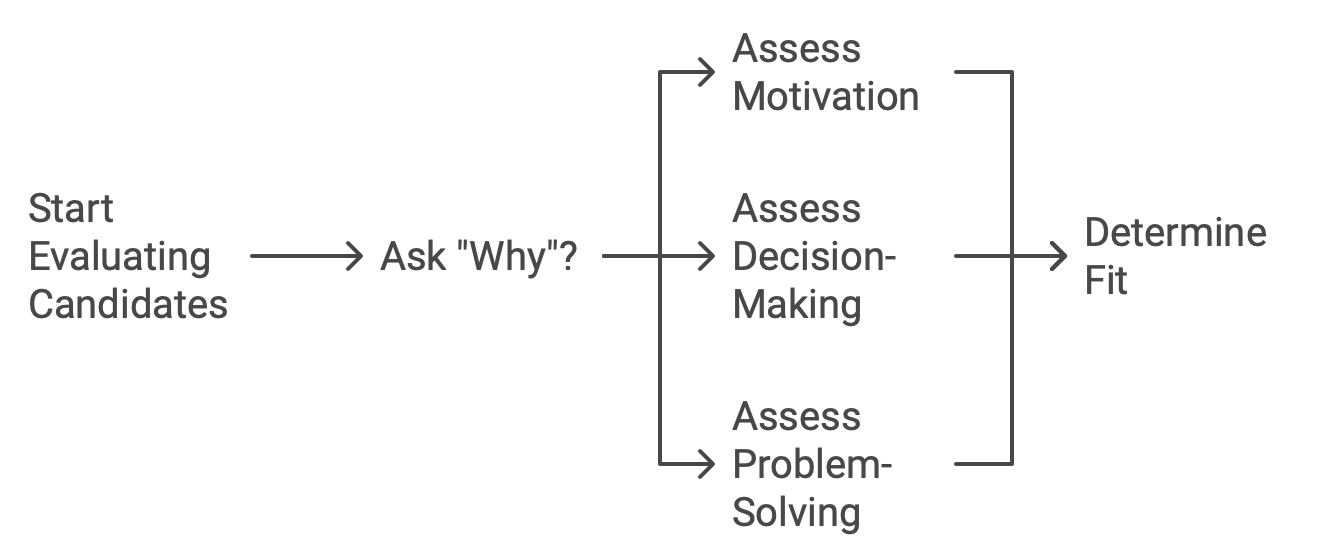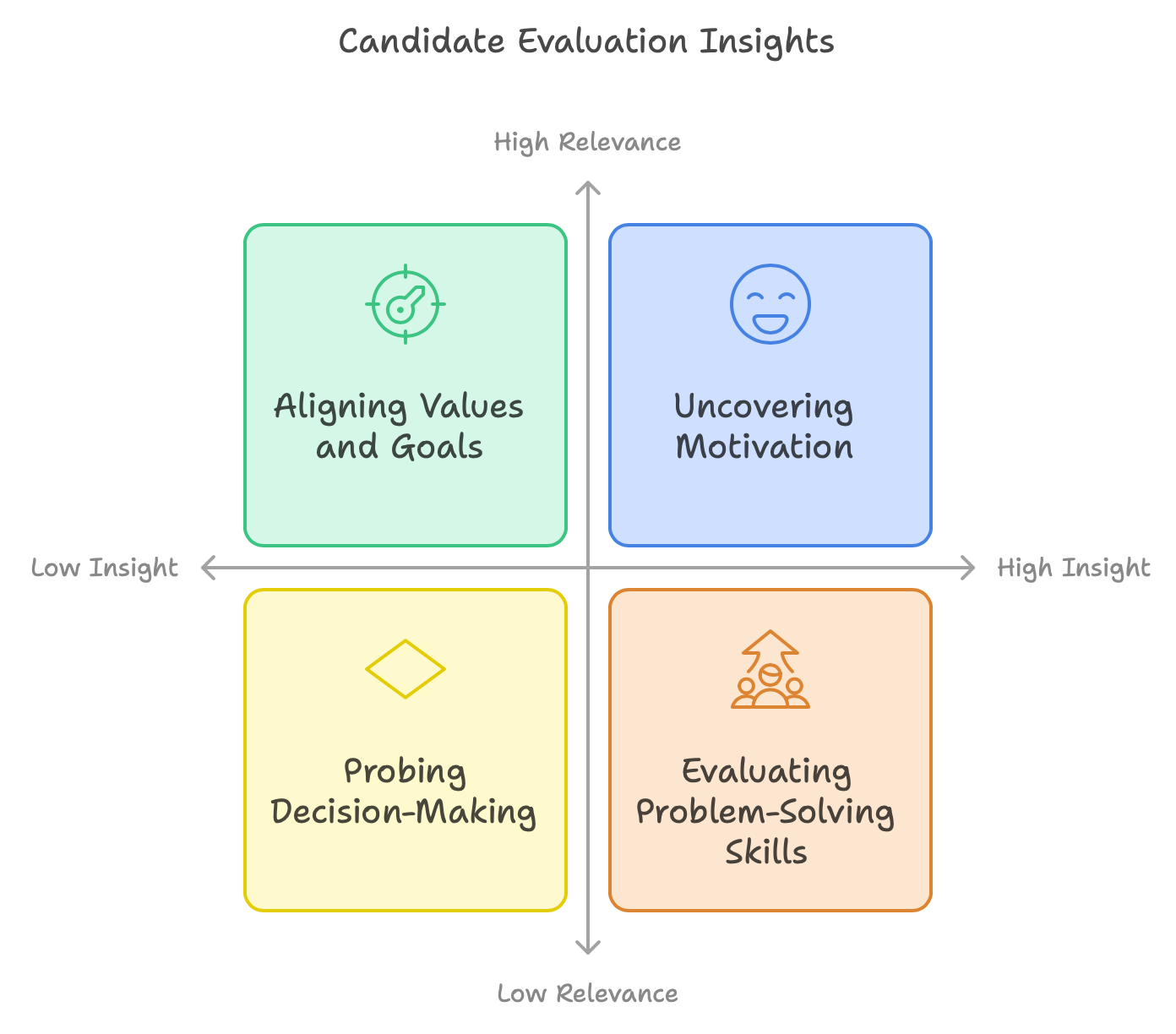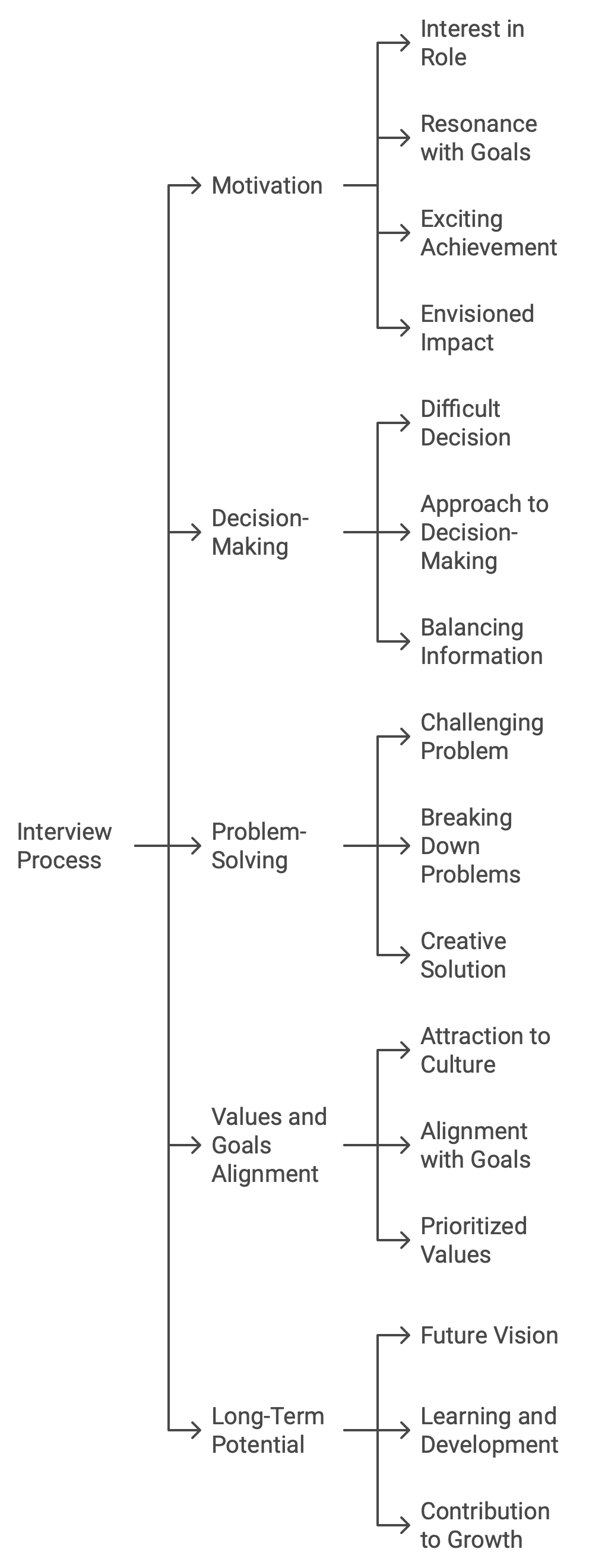Hi,
I'm Olga Fedoseeva, I lead UnitiQ Talent On Demand, a Fractional HR Company dedicated to helping businesses optimize their hiring processes. At UnitiQ, we emphasize understanding candidates’ motivations, decision-making, and problem-solving abilities to ensure the best fit for your team.
When evaluating candidates for a job opening, understanding their motivation, decision-making, and problem-solving skills is crucial to finding the right fit. By starting with the question "why," recruiters and hiring managers can uncover valuable insights into a candidate's thought processes, values, and alignment with the position and company. In this article, we explore the significance of assessing motivation, decision-making, and problem-solving skills through the lens of understanding the candidate's "why."
I'm Olga Fedoseeva, I lead UnitiQ Talent On Demand, a Fractional HR Company dedicated to helping businesses optimize their hiring processes. At UnitiQ, we emphasize understanding candidates’ motivations, decision-making, and problem-solving abilities to ensure the best fit for your team.
When evaluating candidates for a job opening, understanding their motivation, decision-making, and problem-solving skills is crucial to finding the right fit. By starting with the question "why," recruiters and hiring managers can uncover valuable insights into a candidate's thought processes, values, and alignment with the position and company. In this article, we explore the significance of assessing motivation, decision-making, and problem-solving skills through the lens of understanding the candidate's "why."

How to Assess Core Cognitive Skills
1. Uncovering Motivation:
Assessing a candidate's motivation goes beyond surface-level questions. By asking candidates why they are interested in the opportunity, recruiters gain insight into their genuine enthusiasm and alignment with the role and company. Understanding a candidate's underlying motivation allows for a better evaluation of their potential long-term commitment, dedication, and ability to make a meaningful impact.
2. Probing Decision-Making:
Understanding a candidate's decision-making process is critical in determining their suitability for a role. By asking candidates to explain the reasoning behind their past decisions or hypothetical scenarios, recruiters gain insights into their critical thinking, problem-solving abilities, and the underlying factors that drive their choices. Evaluating the "why" behind decision-making helps assess a candidate's ability to weigh options, analyze situations, and make sound judgments.
3. Evaluating Problem-Solving Skills:
Effective problem-solving is a key competency in today's dynamic work environment. By asking candidates why they prefer specific problem-solving strategies or approaches, recruiters can evaluate their analytical abilities, creativity, and capacity to think through complex challenges. Understanding the candidate's thought process behind problem-solving helps assess their ability to identify root causes, develop innovative solutions, and adapt their approach as needed.
Assessing a candidate's motivation goes beyond surface-level questions. By asking candidates why they are interested in the opportunity, recruiters gain insight into their genuine enthusiasm and alignment with the role and company. Understanding a candidate's underlying motivation allows for a better evaluation of their potential long-term commitment, dedication, and ability to make a meaningful impact.
2. Probing Decision-Making:
Understanding a candidate's decision-making process is critical in determining their suitability for a role. By asking candidates to explain the reasoning behind their past decisions or hypothetical scenarios, recruiters gain insights into their critical thinking, problem-solving abilities, and the underlying factors that drive their choices. Evaluating the "why" behind decision-making helps assess a candidate's ability to weigh options, analyze situations, and make sound judgments.
3. Evaluating Problem-Solving Skills:
Effective problem-solving is a key competency in today's dynamic work environment. By asking candidates why they prefer specific problem-solving strategies or approaches, recruiters can evaluate their analytical abilities, creativity, and capacity to think through complex challenges. Understanding the candidate's thought process behind problem-solving helps assess their ability to identify root causes, develop innovative solutions, and adapt their approach as needed.

4. Aligning Values and Goals:
Exploring the "why" behind a candidate's interest in the opening allows recruiters to assess the alignment of values and goals. By understanding what aspects of the role or company resonate with candidates, recruiters can gauge their compatibility with the organization's culture, mission, and values. Aligning values and goals is crucial for fostering engagement, job satisfaction, and long-term success within the company.
5. Assessing Long-Term Potential:
Evaluating motivation, decision-making, and problem-solving skills starting with "why" provides valuable insights into a candidate's long-term potential. Recruiters can gauge their commitment, adaptability, growth mindset, and ability to contribute meaningfully to the organization. Candidates who demonstrate a clear sense of purpose, an ability to learn and adapt, and a drive to make a positive impact are more likely to thrive and grow within the company.
Assessing candidates' motivation, decision-making, and problem-solving skills by starting with "why" enables recruiters to gain deeper insights into their thought processes, values, and alignment with the role and company. By understanding a candidate's motivation, recruiters can assess their long-term commitment and potential for making a meaningful impact. Exploring the "why" behind decision-making and problem-solving provides valuable insights into their critical thinking abilities and creativity. By aligning values and goals, recruiters can ensure a cultural fit and a strong foundation for future success. By adopting this approach, recruiters unlock the true potential of candidates, leading to more informed hiring decisions and ultimately building stronger, high-performing teams.
Exploring the "why" behind a candidate's interest in the opening allows recruiters to assess the alignment of values and goals. By understanding what aspects of the role or company resonate with candidates, recruiters can gauge their compatibility with the organization's culture, mission, and values. Aligning values and goals is crucial for fostering engagement, job satisfaction, and long-term success within the company.
5. Assessing Long-Term Potential:
Evaluating motivation, decision-making, and problem-solving skills starting with "why" provides valuable insights into a candidate's long-term potential. Recruiters can gauge their commitment, adaptability, growth mindset, and ability to contribute meaningfully to the organization. Candidates who demonstrate a clear sense of purpose, an ability to learn and adapt, and a drive to make a positive impact are more likely to thrive and grow within the company.
Assessing candidates' motivation, decision-making, and problem-solving skills by starting with "why" enables recruiters to gain deeper insights into their thought processes, values, and alignment with the role and company. By understanding a candidate's motivation, recruiters can assess their long-term commitment and potential for making a meaningful impact. Exploring the "why" behind decision-making and problem-solving provides valuable insights into their critical thinking abilities and creativity. By aligning values and goals, recruiters can ensure a cultural fit and a strong foundation for future success. By adopting this approach, recruiters unlock the true potential of candidates, leading to more informed hiring decisions and ultimately building stronger, high-performing teams.
Here are some examples of questions which give us a clearer understanding of the candidate values and approaches to critical success-related topics:
1. Motivation:
- Why are you interested in this specific role and company?
- What aspects of this opportunity resonate with your career goals and personal values?
- Can you share a specific example of a project or achievement that genuinely excited and motivated you in your previous role?
- How do you envision making a meaningful impact in this position?
2. Decision-Making:
- Can you walk me through a difficult decision you had to make in your previous role? Why did you choose that particular course of action?
- When faced with multiple options or conflicting priorities, how do you approach decision-making? Why do you find that approach effective?
- How do you balance gathering enough information to make an informed decision without getting stuck in analysis paralysis? Why do you think that balance is important?
3. Problem-Solving:
- Describe a challenging problem or obstacle you encountered in a past project. How did you approach solving it? Why did you choose that specific solution?
- When faced with a complex problem, how do you go about breaking it down into manageable components? Why do you find that method effective?
- Can you share an example of a time when you had to think creatively to find a solution? Why did you choose that particular approach?
4. Values and Goals Alignment:
- What attracted you to our company's culture and mission? Why do you believe you would be a good fit here?
- How does this opportunity align with your long-term career goals and aspirations? Why is it important for you to work towards those goals?
- What values do you prioritize in a work environment, and how do they align with our company's values? Why are those values important to you?
5. Long-Term Potential:
- Where do you see yourself in the next few years, both professionally and personally? Why are those goals important to you?
- Can you provide an example of a time when you actively pursued learning and development opportunities? Why is continuous learning important to you?
- How do you envision contributing to the growth and success of the company in the long run? Why do you feel passionate about making a lasting impact?
These questions aim to delve deeper into a candidate's motivations, decision-making processes, problem-solving approaches, values, and long-term potential. They encourage candidates to reflect on their experiences and provide meaningful insights into their thought processes and alignment with the role and company.
I also recommend you to read some other related articles:
Building High-Performance Teams: Mastering A-Player Talent Acquisition and People Management
How Growing and Scaling Businesses Can Attract Top Talent: Proven HR Strategies for Success
An Entrepreneur guide to Effective Hiring: How to Master the Recruitment Process
The Small Business Hiring Guide: 5 Questions to Ensure Team Fit
1. Motivation:
- Why are you interested in this specific role and company?
- What aspects of this opportunity resonate with your career goals and personal values?
- Can you share a specific example of a project or achievement that genuinely excited and motivated you in your previous role?
- How do you envision making a meaningful impact in this position?
2. Decision-Making:
- Can you walk me through a difficult decision you had to make in your previous role? Why did you choose that particular course of action?
- When faced with multiple options or conflicting priorities, how do you approach decision-making? Why do you find that approach effective?
- How do you balance gathering enough information to make an informed decision without getting stuck in analysis paralysis? Why do you think that balance is important?
3. Problem-Solving:
- Describe a challenging problem or obstacle you encountered in a past project. How did you approach solving it? Why did you choose that specific solution?
- When faced with a complex problem, how do you go about breaking it down into manageable components? Why do you find that method effective?
- Can you share an example of a time when you had to think creatively to find a solution? Why did you choose that particular approach?
4. Values and Goals Alignment:
- What attracted you to our company's culture and mission? Why do you believe you would be a good fit here?
- How does this opportunity align with your long-term career goals and aspirations? Why is it important for you to work towards those goals?
- What values do you prioritize in a work environment, and how do they align with our company's values? Why are those values important to you?
5. Long-Term Potential:
- Where do you see yourself in the next few years, both professionally and personally? Why are those goals important to you?
- Can you provide an example of a time when you actively pursued learning and development opportunities? Why is continuous learning important to you?
- How do you envision contributing to the growth and success of the company in the long run? Why do you feel passionate about making a lasting impact?
These questions aim to delve deeper into a candidate's motivations, decision-making processes, problem-solving approaches, values, and long-term potential. They encourage candidates to reflect on their experiences and provide meaningful insights into their thought processes and alignment with the role and company.
I also recommend you to read some other related articles:
Building High-Performance Teams: Mastering A-Player Talent Acquisition and People Management
How Growing and Scaling Businesses Can Attract Top Talent: Proven HR Strategies for Success
An Entrepreneur guide to Effective Hiring: How to Master the Recruitment Process
The Small Business Hiring Guide: 5 Questions to Ensure Team Fit









